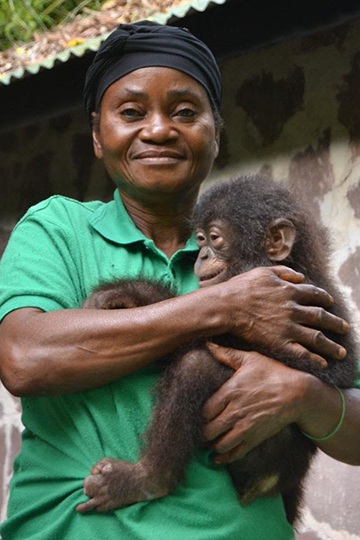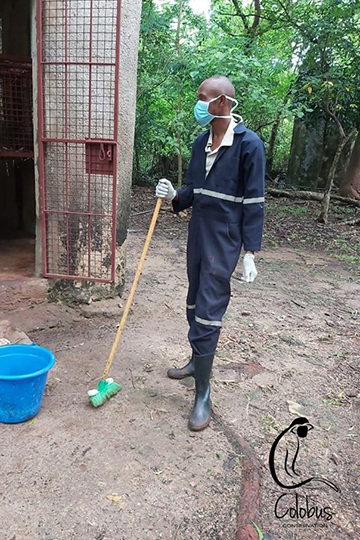by Natasha Tworoski
The COVID-19 virus reached across the globe in such a short period of time, our lives changed dramatically before we had a chance to process it all. Unfortunately, PASA member sanctuaries are not excluded from these difficult times. While scientists work tirelessly to gain a deeper understanding of the coronavirus, sanctuaries across Africa are working hard to protect all the animals in their care during these unprecedented times.
Particularly during the initial months of the outbreak, resources became limited, governments closed borders, and our members implemented protocols to try and slow the rapidly spreading virus. For sanctuaries who already work hard to provide good nutrition and medical attention for their rescues, things got ever more challenging. To protect staff and animals, sanctuaries had to close their doors to visitors and international volunteers. This devastating blow meant a huge loss to income, as well as a loss of the invaluable help provided by volunteers who assist with care for the primates.
There is good reason for PASA caretakers to be cautious about transferring COVID-19 to non-human primates, as the virus has already jumped multiple species. The SARS-CoV-2 virus, which causes COVID-19 in humans, has genetically similar coronaviruses observed in bats and pangolins. Since the bat variation was the closest to the human coronavirus, it is most likely the original source. As of July, a leading hypothesis by epidemiologists is there may be an intermediate species host that transferred the virus from bats to humans. World Health Organization officials are still working in Wuhan to determine how this virus made the jump, which will help scientists understand COVID-19 better and work more efficiently to contain it. Across the globe, research is underway to develop vaccines. This means a variety of animal models have been infected, which includes hamsters, mice, ferrets and three species of monkeys. The symptoms one species gets from infection can vary greatly from another. What this means for sanctuaries working to protect their animals is they don’t know what will happen if any non-human primate species in their care contract the virus. The symptoms and fatality rates could potentially be even worse than those seen in humans. A global genomic analysis released by UC Davis in August compared the main cellular receptor for the virus in humans to 410 species. The study ranked the risk for each contracting the virus based on how closely each species’ physiological make-up of this virus receptor matched humans. Species were sorted into 5 categories of risk. The highest risk category included chimpanzees, bonobos and gorillas, all endangered species living at many PASA member sanctuaries.
In the Democratic Republic of Congo (DRC), Lola ya Bonobo closed their doors to visitors, tourists and all staff are now living at the sanctuary to make sure the bonobos remain cared for while also staying healthy. This means a significant source of income has been lost at the same time that the sanctuary is paying for longer work hours for their dedicated staff. Although they have started to re-open, visits are limited and they desperately need financial aid to support their work.
Kenya took quick measures to discontinue issuing travel visas and to close borders in order to slow the spread of COVID-19. However, this has abruptly stopped income from ecotourism and volunteer help to PASA members Colobus Conservation and Sweetwaters Chimpanzee Sanctuary. Besides greatly affecting the sanctuaries’ ability to care for its patients, Colobus Conservation is now significantly limited in their ability to continue their 24 hour animal rescue response. Both sanctuaries anticipate difficulty in gaining access to the food and medical supplies they desperately need.
“The problem is threefold,” said said Dr. Stephen Ngulu of Sweetwaters. “Revenue has dwindled, food prices have increased, and the necessary implementation of biosecurity measures has further increased our costs.”
While the world eagerly awaits a vaccine to get COVID-19 under control, PASA is tirelessly supporting its members to give the best care possible to all non-human primates. Additionally, PASA is working with the University of Minnesota College of Veterinary Medicine to create an information hub on best practices for caring for non-human primates.
Even though it is a tough time, joy comes even in the darkest hours from the animals themselves – and in being able to rescue those in need. Lola ya Bonobo has managed to rescue several bonobos since quarantine started, and you can follow their progress on Lola’s Instagram and Facebook pages. And at Lwiro Primate Rehabilitation Centre, also in DRC, they recently welcomed an orphaned chimpanzee named Byaombe.
The work continues. If you can support these efforts, your donations will be most appreciated. Please go here to help us get through this unprecedented time.

Lola ya Bonobo, in DRC, has rescued 9 bonobos despite COVID-19. (Note: Bonobos are not pets; this orphan was assigned to a surrogate mother for caretaking.)

At Colobus Conservation, in Kenya, biosecurity measures help protect the animals and staff.
